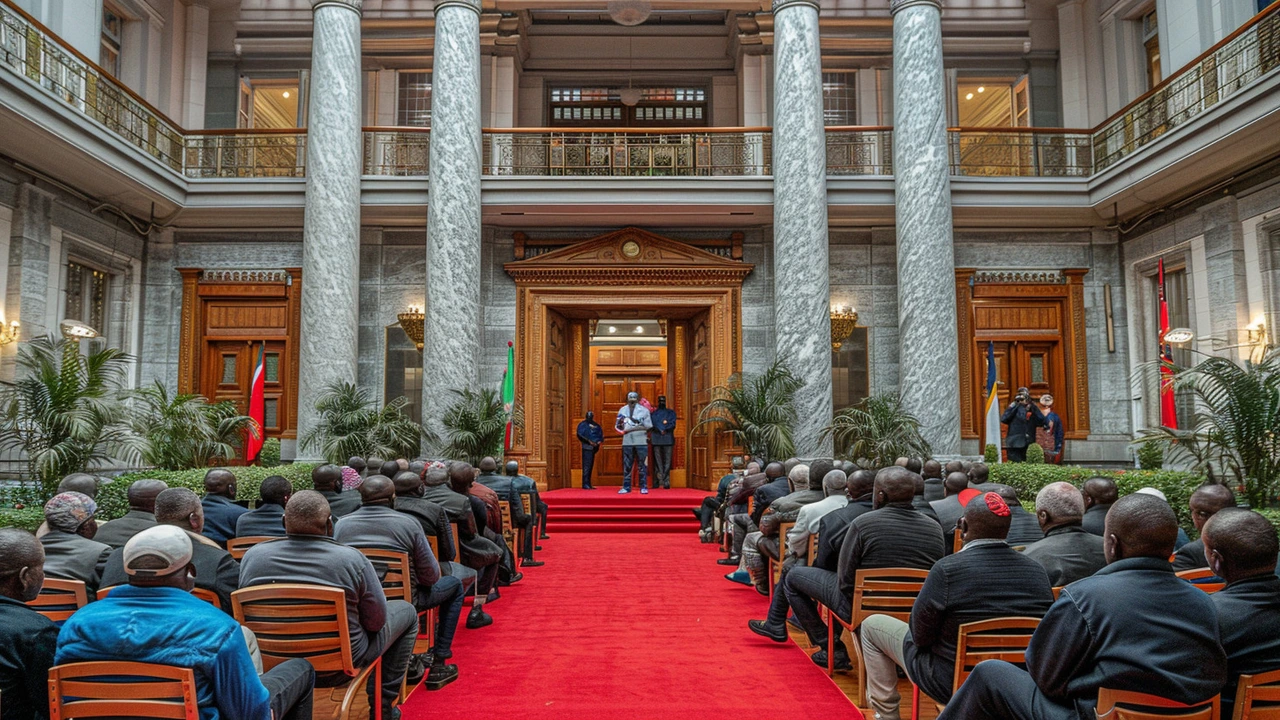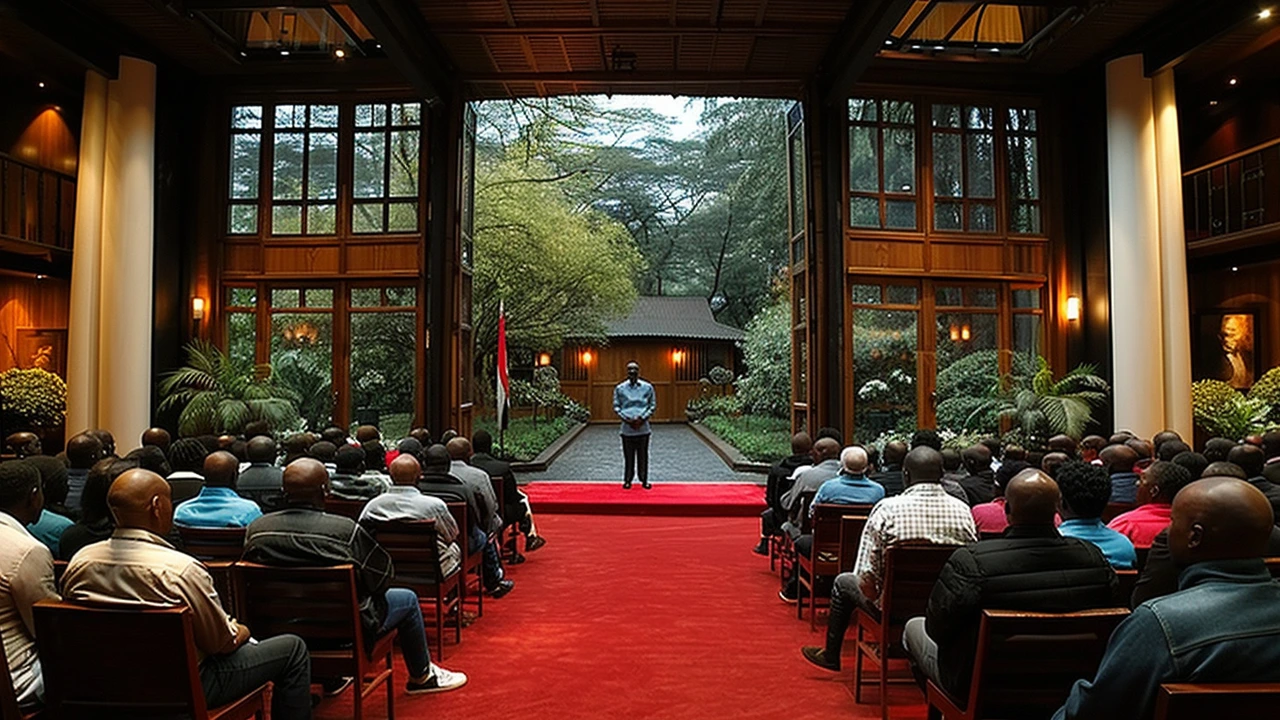President Ruto's Directive on Muguka: A Call for Stakeholder Consultation
President William Ruto has taken a significant step in addressing the recent controversy surrounding the ban of muguka, a popular stimulant, in Kilifi and Mombasa counties. He has ordered the Ministry of Agriculture and Livestock to engage with various stakeholders to thoroughly review and discuss the sale and use of muguka. This directive underscores the government's commitment to considering the diverse opinions and needs of all parties involved.
Agriculture Cabinet Secretary Mithika Linturi brought to the President's attention that muguka is classified as a scheduled crop under the Crops Act, 2013, and the Miraa Regulations, 2013. Given its legal status, the ban imposed by Kilifi and Mombasa counties has sparked considerable debate and concern among farmers, traders, and consumers who rely on muguka for their livelihood.
The Importance of Stakeholder Engagement
The President's directive for stakeholder engagement is a strategic move to ensure that all voices are heard and that any regulatory measures concerning muguka are grounded in a thorough understanding of its economic, social, and cultural impact. This approach aligns with democratic principles and showcases the government's willingness to foster collaborative governance.
One of the key steps in this process is the convening of a consultative forum aimed at addressing the concerns raised by various stakeholders. This forum will serve as a platform for open dialogue and the exchange of ideas, ultimately leading to the implementation of the Miraa/Muguka Regulations, 2023. By bringing together farmers, traders, policymakers, and other interested parties, the government aims to develop a fair and effective regulatory framework for muguka.
Financial Support for Scheduled Crops
In addition to regulatory measures, the government has announced a plan to allocate Sh500 million in the 2024-25 financial year for the value addition of scheduled crops, including muguka. This financial support is expected to enhance the quality and marketability of these crops, providing a much-needed boost to the agricultural sector and improving the livelihoods of farmers and traders.
The allocation of Sh500 million demonstrates the government's recognition of the economic significance of scheduled crops and its commitment to supporting the agricultural community. By investing in value addition processes, the government aims to create new opportunities for growth and development within the sector, ultimately benefiting the entire economy.
Miraa/Muguka Pricing Committee
Alongside the financial allocation, the government has also established a Miraa/Muguka Pricing Committee to regulate the prices of these crops. The Council of Governors has nominated three members to this committee, underscoring the importance of collaborative governance and the inclusion of regional voices in decision-making processes.
The Pricing Committee's role is crucial in ensuring fair and stable prices for muguka, protecting both producers and consumers from market fluctuations. By regulating prices, the committee aims to create a more predictable and sustainable market environment, fostering economic stability and growth.
Commitment to Combating Illegal Substances
Despite the steps taken to support the muguka industry, the government remains steadfast in its commitment to combating drugs, illicit brews, and other illegal substances. This balanced approach shows the government's dedication to safeguarding public health and safety while also supporting legitimate and economically important agricultural activities.
The government's dual focus on regulation and enforcement highlights its comprehensive strategy to address the complex issues facing the muguka industry. By promoting responsible use and trade, the government aims to mitigate the negative consequences associated with substance abuse while also supporting the livelihoods of farmers and traders.

Conclusion: A Balanced Approach to Muguka Regulation
President William Ruto's directive for stakeholder engagement over the muguka ban is a clear indication of the government's commitment to inclusive and balanced decision-making. By involving all relevant parties in the discussion, the government aims to develop a fair and effective regulatory framework that supports the economic, social, and cultural significance of muguka.
The planned financial support for value addition and the establishment of a Pricing Committee demonstrate the government's recognition of the importance of scheduled crops and its commitment to supporting the agricultural sector. At the same time, the government's continued efforts to combat illegal substances reflect its dedication to protecting public health and safety.
As the government moves forward with its consultative forum and other initiatives, it is essential that all stakeholders remain engaged and committed to finding sustainable solutions that balance the diverse interests and needs of the community. Through collaborative governance and a comprehensive approach, the government can ensure that its policies and regulations benefit all parties involved, ultimately contributing to the overall well-being and prosperity of the nation.


 Sports
Sports
Roland Baber
May 29, 2024 AT 18:35It's encouraging to see the President take a step toward inclusive dialogue. Stakeholder forums can bridge the gap between policymakers and those who live off muguka. By listening to farmers, traders, and consumers, the government gains a holistic view of the crop's impact. This approach may also defuse tensions that have been brewing in Kilifi and Mombasa. Ultimately, a balanced policy could preserve livelihoods while addressing health concerns.
Phil Wilson
May 30, 2024 AT 16:49From a regulatory perspective, integrating stakeholder feedback aligns with best‑practice governance frameworks. Leveraging data analytics can pinpoint price elasticity and market dynamics, ensuring the new Pricing Committee is data‑driven. Deploying targeted subsidies for value‑addition will enhance export potential, especially within the compliance niche. In short, this multi‑pronged strategy should yield measurable economic uplift.
Roy Shackelford
May 31, 2024 AT 15:02We have to ask who's really pulling the strings behind this so‑called consultation. It's a classic move: present a facade of openness while the agenda stays hidden. The ban was politically motivated, not a public health measure. Expect more behind‑the‑scenes deals that keep the real power brokers untouched. Stay vigilant, because transparency is still a myth.
Karthik Nadig
June 1, 2024 AT 13:15😂 Absolutely! The drama is real, and the stakes are high. They think a forum will calm the storm, but the real storm is the hidden agenda. When will they let the farmers speak without a script? This is just a staged performance. 🌪️
Charlotte Hewitt
June 2, 2024 AT 11:29They probably want to control everything, as usual.
Jane Vasquez
June 3, 2024 AT 09:42Oh, look, another conspiracy soup 🍲-just sprinkle in a little “stakeholder forum” and pretend we’re all buddies now. 🙄 If only they’d let the real issues be solved without the drama of secret meetings.
Hartwell Moshier
June 4, 2024 AT 07:55Sounds like a good plan for the people involved.
Jay Bould
June 5, 2024 AT 06:09From a cultural angle, muguka isn’t just a crop-it’s part of the local heritage. Respecting that tradition while introducing modern regulations could be a win‑win if done right.
Mike Malone
June 6, 2024 AT 04:22The initiative to convene a stakeholder forum represents a noteworthy evolution in policy formulation, one that transcends mere top‑down edicts. By fostering an environment wherein multifarious voices-including agronomists, local chieftains, commerce agents, and public health officials-may articulate their perspectives, the government ostensibly embraces a participatory paradigm. Such a model, when executed with rigor, can elucidate the nuanced interdependencies that characterize the muguka economy, from cultivation practices to downstream value‑addition processes. Moreover, the allocation of Sh500 million earmarked for scheduled crops signals a substantive fiscal commitment, potentially catalyzing agronomic research, infrastructure upgrades, and market diversification. The establishment of a dedicated Pricing Committee further underscores an intent to stabilize market volatility, thereby safeguarding both producer margins and consumer affordability. Nonetheless, the efficacy of these mechanisms hinges upon transparent governance, data‑driven decision‑making, and vigilant oversight to preclude any capture by vested interests. In the broader sociopolitical tapestry, this bilateral focus on economic empowerment and drug control reflects a calibrated balance between development and public health imperatives. Should the consultative forum genuinely synthesize stakeholder input, the resultant policy could serve as a template for analogous sectors grappling with regulatory complexities. Conversely, superficial engagement would erode trust and perpetuate the very discontent the initiative aims to mitigate. Ultimately, the trajectory of this endeavor will be determined by the sincerity of dialogue, the robustness of implementation frameworks, and the willingness of all parties to pursue collective well‑being.
Pierce Smith
June 7, 2024 AT 02:35I appreciate the comprehensive approach outlined in the recent announcement. Balancing economic support with public health safeguards is essential, especially for crops with deep cultural roots. The proposed stakeholder forum could indeed bridge gaps if participants feel heard. Let’s hope the Pricing Committee operates transparently to benefit both producers and consumers.
Abhishek Singh
June 8, 2024 AT 00:49Sure, another fancy plan that’ll never work.
hg gay
June 8, 2024 AT 23:02It’s understandable to feel skeptical, but the allocation of funds and the inclusive forum could genuinely uplift communities if followed through. 🌱 Let’s keep the conversation open and support each other throughout the process. 🤝
Owen Covach
June 9, 2024 AT 21:15Cool move, hope it works.
Pauline HERT
June 10, 2024 AT 19:29Honestly, if they truly want progress, they need to cut the red tape and let the market breathe. No more token meetings.